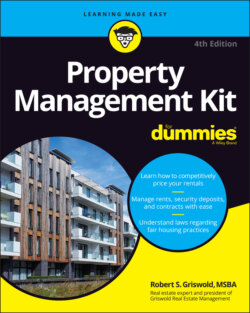Читать книгу Property Management Kit For Dummies - Robert S. Griswold - Страница 63
Being aware of the tax consequences
ОглавлениеAs a rental property owner, you’re running a business and must file Schedule E with your federal tax return. The tax laws allow your rental housing business to deduct all operating expenses, including the costs of advertising, maintenance, payroll, insurance, property taxes, and management fees, whether those expenses are paid to yourself or a property management firm. Note: Federal and state tax codes change from year to year, so discuss your tax situation with your accountant or tax preparer in advance. The Internal Revenue Service (IRS) and state taxing authorities will also be expecting you to declare any income you may have paid yourself as a property manager.
Although your expenses are deductible, they erode the net income from your property. If your annual expenses are greater than your rent revenue, you may find that you can use those losses to ease the tax burden from your full-time job or other sources of income unrelated to your rental property. But a loss is a loss, and trying to keep your rental property in the black is still a good idea, even if you have to pay some taxes on the income.
The IRS’s passive-loss rule states that all real estate rental activities must be treated as passive, with an exception that some taxpayers are allowed up to a $25,000 annual deduction, with this deduction being phased out as the taxpayer’s reported income increases. There is also some limited ability to carry-back or carry-forward unused losses if the rental property owner meets certain criteria. A net operating loss (NOL) allows a rental owner to apply any unused NOL to a previous year’s tax return for an immediate refund of previous taxes paid. Although a tax-loss carry-forward applies a tax loss to future years’ tax returns, again it is subject to limitations or phasing out of the deduction based on the rental property owner’s overall reported income.
Real estate investors who can be classified as real estate professionals, however, are permitted to deduct all their rental real estate losses from their ordinary income, such as current employment income (wages and commissions), interest, short-term capital gains, and nonqualified dividends. See Chapter 20 for more information on whether you meet the stringent IRS requirements to qualify as a real estate professional. If you do, you have a significant advantage that makes real estate investing more lucrative. Check out Real Estate Investing For Dummies, 4th Edition (John Wiley & Sons, Inc.), for the latest information on the tax advantages for real estate investors in the 2017 Tax Cuts and Jobs Act (TCJA).
Even though federal real estate taxation laws consider most real estate activities to be passive rather than active investments, definite tax advantages exist for owners who are actively involved in the management of their rental properties. The definition of actively involved allows you to hire a property management firm and still take advantage of the tax write-offs available for rental income property as long as you’re involved in setting the rents and policies for the property. Be prepared to show the IRS or state income taxing authority written proof that you were involved with any such day-to-day decisions made in conjunction with your property manager.
